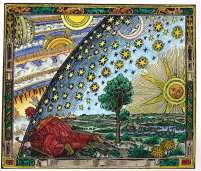Alchemy's Origin
Alchemy, according to esoteric writers, is said to be the invention of an ancient Egyptian sage called Hermes Trismegistus.
The "Father of Alchemy" lived in an unknown age of Egyptian history, though he is thought by some Rosicrucian schools to have
lived during the time of Moses and the Exodus of the Israelites. If true, being an Initiate of the mysteries of Isis and Osiris,
Moses must have been tutored by Hermes himself, which later enabled him to carry out his mission and to realize his I AM Presence
symbolised by the burning bush. The various precepts and the Ten Commandments of the Lord of Hosts revealed to the Israelites
by Moses are the first alchemical steps of purification and putrefaction. Further steps were later added to the Mosaic revelation
by the Nazarene Master. Indeed, the Christ declared that he came not to abolish the previous revelation, but to fulfill it.
It is thought by some that "Hermes Trismegistus" constituted a title assumed by distinguished hierophants of the Mystery
Schools, in a somewhat similar manner that Zoroaster, the founder of the "Fire Religion" is regarded by certain scholars.
Incidentally, alchemy may also be considered a Fire Religion, or at least a philosophy, because of its symbology of fire related
to the alchemical principles, its prerequisite in the art of transmutation, and to the respect and honor paid to it by alchemists.
Jewish mystics identify Hermes as the antediluvian prophet Enoch, or Idris, as the Muslims call him; while ancient Egyptians
see Hermes as Thoth, the god of Wisdom, Learning, and Writing. He was given this apotheosis along with Imhotep, the great
architect under the reign of King Zoser of the Fourth Dynasty. It would appear that both men were overshadowed by the archetypal
figure of Thoth, and were acknowledged as such by both the inner and outer circles of initiates of the Mystery Schools. Thoth,
or his Greek counterpart, Mercury, was a messenger of the gods; and as an archetypal incarnation of this god, Hermes lived
up to his name by his literary productiveness. Ancient writers declared that the "Trice Greatest" wrote thousands of books
on what later became known as Hermeticism and Alchemy. It is unfortunate that very little of Hermes' works survived the conflagration
and destruction of libraries and books by Roman and Christian zeal in the early dawn of the Piscean Age. The world as a whole
is still ignorant of the great loss, and it will take some time before the invocation is made by the masses for the Greater
Light, for disclosure of eternal principles that would shine upon the paths of men, and consequently, for a full restoration
and establishment of an occult library of the world, with an archive and database of every known system and tradition of the
metaphysical side of life. Although little is known of Hermes, it is evident through the works attributed to him that he was
an intermediary of the Wisdom Ray of the Supreme Being.

